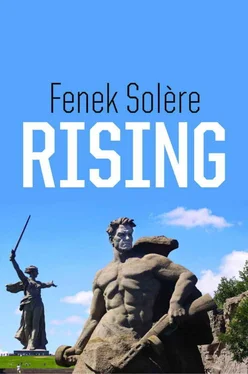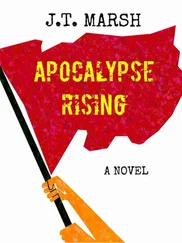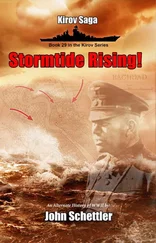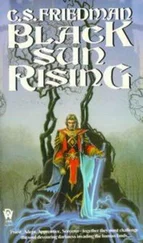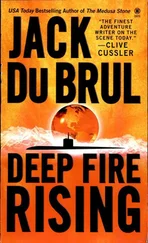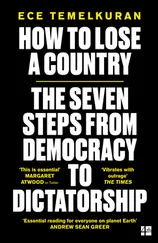• The signing of the Gdansk Charter by which Russia agreed to find a political rather than a military response to what was now being termed ‘the Great Migration’ of Chinese, Turkic, and Muslim peoples into its living space;
• The EU and the US deploy missile systems in Poland and the Czech Republic in advance of sending peacekeeping forces into Western Ukraine;
• The Russian Duma introduces a third wave of sweeping austerity measures as a result of the ongoing financial crisis that had begun in 2014;
• An analysis estimates that two-thirds of Russians live on the poverty line; every winter they die off in their thousands as the temperatures drop outside their crumbling apartment blocks;
• $300m wiped off investments in a single 24-hour period and a 30 percent depreciation of the rouble against a basket of currencies.
Social disintegration seemed inevitable as wave upon wave of immigrants overwhelmed cities, towns, and local communities between Vorkuta and Saratov. Compounding this there was continuing evidence that the European Union, the US government, and various NGOs were still pouring money into so-called democratic groups to further destabilise the country. Adding insult to injury, Pussy Riot’s Nadezhda Tolokonnikova and Maria Alyokhina had been awarded the Nobel Prize for Literature. This was followed rapidly by worldwide coverage of the publication of Mikhail Khodorkovsky’s proposed new constitution for Russia and his tumultuous reception at Ben Gurion airport, where he was welcomed with open arms by the leader of the Knesset.
Despite recent outrages against native Russians in South Ossetia and Grozny, it was clear that the anti-Russian narrative in the Western press, starting with the sabre-rattling after the downing of a Malaysian passenger flight over Torez, was not going to slacken. Alleged atrocities by the 108 thand 5 thMotor Rifle Divisions and the 860 thSeparate Motor Rifle Regiment in Surgut and Salekhard were being investigated by Commissioners from the UN’s War Crimes Tribunal. Media frenzy followed the retaliatory cluster bombing by Russian SU-24 fighters against bandformirovaniya , literally bandit formations, roaming the countryside ethnically cleansing the land of Whites to create new Muslim settlements in Dombaj, Sukhumi, and Elista. Further accusations of human rights abuses from Magadan in the east to Tver in the west were broadcast on CNN, the BBC, and Al Jazeera. The signs were ominous: Parnas, the liberal grouping, and larger-than-life characters like Navalny, Dobrokhotov, and Kozlovsky were being portrayed as heroes. Chechen warlords like Aslan Maskhadov, Abdul Halim Sadulayev, and Dokka Umarov were spoken of in reverential terms. The Russian GDP had fallen for the seventh year in succession and OPEC continued to pump the market with petroleum, keeping prices low. Meanwhile, the United Russia Party had collapsed in the wake of yet another financial scandal, forcing Vladimir Putin, Father of the Nation, freshly released from house arrest, to step down from public life.
Soon after Putin’s enforced retirement, Kazakhstan had withdrawn from the Customs Union with Russia and Belarus, joining with the fundamentalist Mohammedans aligned with the Council of God based in Mecca. Russia, already expelled from the World Trade Organization at the insistence of the Israeli Prime Minister and a coalition of international business leaders, was now essentially blackmailed into becoming a signatory to the Transatlantic Trade and Investment Partnership, effectively allowing the seizure of Russian assets in lieu of unpaid debts. Within days of the WTO announcement, the UN had imposed food and trade embargoes in response to the Kremlin’s continued opposition to its humanitarian missions in eastern Ukraine. All economic indices showed Russia to be in an economic crisis far deeper than it had faced in the last decade of the twentieth century. Taking advantage of Moscow’s geopolitical weakness, Brussels had forced a revision to the 2010 delineation of the Norwegian-Russian Arctic Maritime border, giving the EU greater access to the oil and gas fields on the sea bed. The Organisation for Security and Cooperation in Europe began stating openly that it would fund Alexei Navalny’s Progress Party as reports of irregularities at 50 percent of polling stations during the last elections emerged.
Tom felt nervous as he strode towards the winking light signalling his turn at the immigration desk. He was not sure what kind of reception he would receive. The world was changed now. He was thinking of all those old clichés, like Checkpoint Charlie in Berlin, or being dragged off by stern-faced men in crumpled suits for questioning. It was very clear that Professor Hunter was no Harry Palmer. He had read Len Deighton and Le Carré, and his first experience of Russian bureaucracy played right into Western preconceptions. Brutal formica faces reflected on the shiny tabletops. There was a plethora of forms that needed to be completed in triplicate, stamped, and sanctioned. The former Eastern Bloc still seemed to be living in the shadow of the Wall. An Iron Curtain separated the new breed of capitalists from Homo Sovieticus .
Given clearance, he made his way to baggage handling, past keen-eyed security and customs staff, out to a lemon-lit foyer where circulating conveyor belts chugged consumptively, spewing shrink-wrapped luggage close to the taxi ranks. There were all sorts of bemused and confused people milling around. He saw the excited and tired meeting of relatives and friends. There was patrolling militia in high-vis jackets, Kalashnikovs looped lazily over their shoulders, gun barrels pointing at chipped floor tiles. Outbound passengers wandered about, faces scanning electronic screens, watching the intermittent updates for connections. Long-separated couples rushed to embrace. Frosty fathers returning from business trips gave guilty gifts to their children in full view of beaming babushkas overwhelmed with emotion at the sight of their daughters re-united with their errant husbands before the winter ice storms set in.
Tom’s attention was caught by a news-flash about a gun attack in Omsk. He gripped his brown leather case and meandered after a Karelian couple walking towards the ‘to the city’ sign. Standing on the cracked pavement of the concourse, he realised there would be no welcoming committee from his contacts in the Borean Alliance. He had not really expected one. Not even vocal protests from Black Bloc youths waving a ‘Go home British Fascist’ banner. Controversy had followed him ever since his work on the Septentrion Project antagonised the Antifa mobsters. They had disrupted his lectures and burned his books after he came out as an outspoken supporter of the British guerrillas fighting alongside the French Resistance against the newly-imposed Eurabist Regime in Paris. At the same time, his warnings about the North African Federation of Muslim Nations fomenting civil unrest in Central Asia had not been overlooked. He received unpleasant calls in the middle of the night and death threats from crazed zealots operating out of ghettos in the north of England.
Tom had long harboured the suspicion that because the Slavs had escaped most of the corrosive influence of political correctness, they would act as a catalyst for a White revolution. For years following the murder of a Russian boy whilst defending his girlfriend from molestation by immigrants in the Moscow district of Biryulovo, thousands of marchers had come out on the streets, carrying Romanov flags on National Unity Day, screaming ‘Rossiia est sviataia Rus!’ The war in Donbass and the clarion call to Muslims in Tajikistan, Turkmenistan, Abkhazia, Kazakhstan, and Dagestan to join their brothers in a jihad had polarised communities from Novgorod to Tomsk. There was a real threat to internal stability now that the Russian army had been pushed back over the Terek River in Chechnya, and both the European Union and the United Nations were set to recognise the Free Republic of Ichkeria.
Читать дальше
